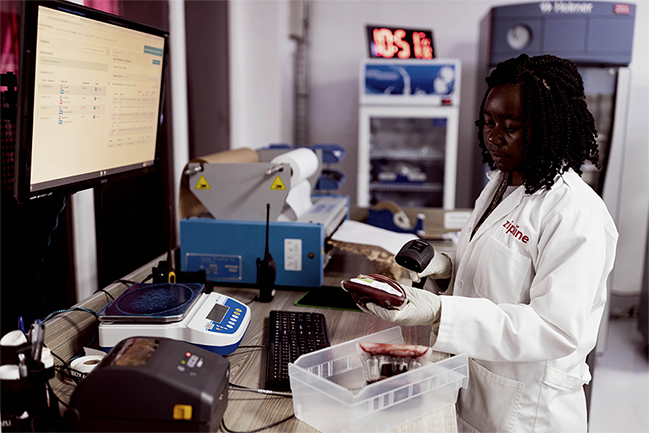‘Lately, when I wake up and look at the Africa around me, I recognise the opportunity this new Africa represents in the age of AI and smart technology. The possibilities that abound with the use of data and solutions that can change lives in health, education, deep tech, research, fintech, agritech and climate change. Africa must embrace and adopt AI as a key, if not the most important, form of technology to make sure we are truly part of the Fourth Industrial Revolution.’ These are the words of John Kamara – Kenyan founder of health platform AfyaRekod and the AI Centre of Excellence in Nairobi – in his foreword for the 2022 State of AI Africa report, published by AI Media.
Recently, AfyaRekod – a revolutionary new universal patient portal that uses blockchain to track health data, giving patients and the medical professionals who treat them real-time access to their health information – launched in the UK, making it a leading African AI export in the realm of e-health.
Kamara is one of the trailblazers leading the charge towards the promised land of AI-enabled health systems that have the potential to save and improve countless lives throughout the African continent – if they can be realised. And that’s a big if.
‘We have seen a marked shift towards embracing AI in healthcare, particularly in the wake of the pandemic,’ according to Tshilidzi Marwala, AI engineer, professor, vice-chancellor and principal of the University of Johannesburg. ‘For example, data science competition platform Zindi, which is based in South Africa and Ghana, has initiated a competition sponsored by the Artificial Intelligence for Development in Africa network, which requires data scientists to create an epidemiological model that forecasts the spread of COVID-19 throughout the globe. This is critical for both policymakers and health workers to make informed decisions and take action.

‘In Rwanda, the government has collaborated with US start-up Zipline to deliver blood supplies by drone to remote areas. Where a journey would have taken three hours by car, a drone can complete the trip in six minutes, addressing the need for emergency medical supplies in rural areas,’ he says. ‘In Limpopo, South Africa, CT scans and a picture-archiving communication system have been used to improve the speed of diagnosis and management of the associated conditions.
‘AI also addresses concerns of a shortage of doctors, particularly in the public sector. For example, the increased speed and accuracy of cancer diagnostics through analytics – which can characterise tumours and predict therapies – has not replaced doctors but quickened their efforts and given them the space to attend to more patients. Technologies such as AI will decrease the cost of healthcare globally.’
There can be no denying that AI is an essential ingredient in the continent’s future health, both economically and literally. Yet, even with these encouraging examples, and with the huge nudge forward necessitated by the COVID-19 pandemic, greater efforts are required to capitalise on these gains and harness the inestimable potential of AI to save lives.
Kamara adds that ‘we’re falling behind in some key areas’, explaining that there is not enough investment in AI research, African AI start-ups or the infrastructure required to support AI. ‘We need to train more AI engineers and create an enabling environment for them to become creative. The potential benefits AI promises will come to naught without committed investment,’ he says.
Marwala, who was recently appointed African rector of the UN University and served as deputy chair of South Africa’s Presidential Commission on the Fourth Industrial Revolution, has long argued that AI provides us with an opportunity to address some of our most deep-seated challenges.

‘According to the International Finance Corporation, healthcare in sub-Saharan Africa remains the worst in the world. AI opens up the scope of healthcare, allowing doctors to reach more patients in areas often inaccessible. However, there are some substantial challenges we face. There is a lack of data availability and quality, which is demonstrated by the proliferation of algorithmic bias. For example, in 2019 a study found that risk-prediction algorithms led to black patients receiving less-quality care than their counterparts in other race groups,’ he says.
‘Then, of course, is the obstacle of the high cost of AI implementation. There is the cost of data acquisition to consider alongside the cost of hardware and computing resources. According to Analytics Insights, the cost of a complete custom AI solution can vary from US$20 000 to US$1 million. Much of the medical technology is inaccessible in the Global South because of the exorbitant costs.’
Marwala offers the example of the X-ray computed tomography (CT) scanner, ironically developed by the South African-born American Allan MacLeod Cormack, yet not readily available in the Global South. ‘It is, therefore, important that companies in the Global South start manufacturing medical devices with a focus on making these affordable and appropriate for the Global South. While this is certainly an extreme example, it does provide some insight into the investment required. We also have to consider the state of infrastructure in the region, particularly with regard to internet and electricity. We need not look further than South Africa to recognise what a hurdle our energy challenges pose.

‘Then, there are glaring policy gaps. Countries in the region have just begun formulating their AI strategies. We need a comprehensive policy framework that speaks specifically to healthcare.’
Deshen Moodley, associate professor at the department of computer science at the University of Cape Town, says ‘critical mass’ is needed to grow and scale AI capabilities in Africa. He is also co-director of the Centre for Artificial Intelligence Research (CAIR), which seeks to contribute towards creating that ‘critical mass’ – at which point, presumably, an increase in skills, funding and infrastructure will lead to the innovation and scaling of AI products, systems and interventions with far greater ease.
CAIR brings together nine established and two emerging research groups across eight universities in South Africa, funded primarily by the Department of Science and Innovation. ‘We are trying to scale this up and connect people, but it’s hard work,’ says Moodley.
In September, the Africa Centres for Disease Control and Prevention and Smart Africa Alliance (a partnership between 32 African countries) concluded an agreement to work together towards accelerating the use of digital technologies to improve healthcare and strengthen health systems across the African continent. It’s these types of networks and collaborations that will ultimately lead to Moodley’s ‘critical mass’, and although it’s not easy to gauge when it will be reached, the trajectory is clearly heading in the right direction.
















